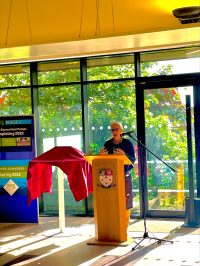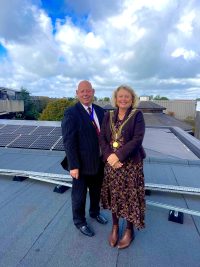Plymouth Marjon university exceeds the vision and becomes one of the greenest universities in the country. Doing their bit to protect the planet, Marjon's is committed to zero carbon by 2030.
With the ground source heat pumps being installed, final checks completed and the launch being made official, Plymouth Marjon has become the first university to implement a GSHP scheme of this size.
Cutting their carbon from 80% since 2009 Professor Debby Cotton, Director of Academic Practice & Professor of Higher Education, proudly stated: “As a university, it is nice to think that we are setting that stage with all the other universities in Plymouth and for the other education institutions.”
Marjon Zero allows the campus to have clean and renewable ways of heating the buildings. The ambition is to improve lives for everyone and Marjon’s is committed to doing everything they can to protect against climate change.
120 ground source heat pumps have been installed around campus which is saving 617 tonnes of carbon per year.
These two phases that have been carried out, both the heat pumps and solar panels, save the equivalent of the energy used by 100 homes, burning 1260 barrels of oil or charging 66 million smartphones.
In an interview, Professor Debby Cotton said: “All universities are working really hard to try and better sustainability and what they do, lots of them have really tight net zero targets, and yet Marjon has been leading the way.”
“Marjon declared a climate emergency some while ago and that was encouraged and supported by the students at the university. Most students and many young people see sustainability and climate changes as the most important issue of their time.” - Professor Debby Cotton
Becoming Carbon Neutral has been the main goal of Marjon’s for the past two years. As an institution, they have stressed the fact that Carbon reduction is crucial. However, staff have still described that it is just as important to have students see what they are doing, and get them involved with speaking about carbon reduction activities, than just doing them quietly.
Debby Cotton said: “For me, the really important thing is that we are not only doing it as a university but that we are also setting an example so when students see what Marjon has done here they will then graduate and go out to other organisations and they can see what is possible. To know that they have been at a university that is at the cutting edge of sustainability and they can then go out and say to others, why aren’t you doing it this way, this is what can be done around Carbon reductions.”
On Thursday 6th October the Marjon Zero launch took place and the Plymouth Lord Mayor unveiled this fantastic project.
With the help of Salix finance and Plymouth City council, the funds and support allowed Marjon to work towards net zero carbon emissions.
Salix funded £3.5 million for the GSHP installation and before that Marjon accepted another grant from Salix to insert approximately 2000 solar panels which have saved 300 tonnes of carbon per year.
The launch proved just how grateful everyone was for The Department for Business, Energy and Industrial Strategy. Councillor Mark Coker said: “With Marjon in particular they (Salix) were one of the first partners with the city council to engage because they realised what it meant to not only Marjon but to Plymouth and the country to lead the way.”
The turnout for Marjon zero’s launch proved just how many people worked endlessly on bettering the university’s sustainability. Not only that but this idea of preaching about everyone doing their bit was the main topic of discussion, especially when speaking to the Lord Mayor.
She said: “The city council has done a lot in raising their bar and having that engagement but we have got to do a lot more, so from a city council point of view, I think we got to just keep pushing and also making sure that as an authority we don’t take our eye off climate change and what we need to do, it’s beholden that we all do our bit”.
Sustainability has three main groups; economic, environmental and social. The issue brought up at Marjon Zero was that actions need to be done so that others are inspired to do their part.
The Lord Mayor said: “Sustainability is the way that current generations are making sure that we are looking after generations for the future. Green growth is good for the planet but also great for the economy. When you’re looking at how we are going to heat houses and grow food in the future we have got to do it in a more sustainable way.”
Councillor Mark Coker spoke more on this: “For us as councillors, I think it is to lead by example and also encourage other people to take those first steps”.
“When we passed the climate emergency motion of council, that's not just words you have to do things as well. So, then we had the climate emergency action plan, and then we had to think how do we deliver this. And to do that you have to have some very difficult conversations because they're not easy.” - Plymouth Lord Mayor
“One of the gaps that are really worrying me with this is that we are engaging with young people, but we are not as a country engaging with the 40-50-60-year-old age group. And if we don’t we are missing a really big bit out” - Councillor Mark Coker
This is only the beginning of Marjon’s sustainable solutions. Despite the incredible success Plymouth Marjon university has shown already they have phases yet to carry out. The future for Marjon Zero is to go on to retrofit current buildings and make their campus a greener space. This will be done by expanding their green spaces and the biodiversity around campus.





